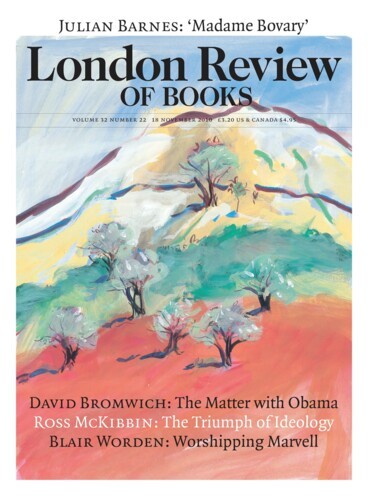In all democratic societies the relations between politicians and the press are close and problematic. But in Britain those relations developed earlier than anywhere else; earlier even than in the United States or France. Britain was the first society to develop a mass urban industrial working class and industrial-commercial middle class. Its newspapers were a consequence of this, and some, like the News of the World or the Daily Mirror, had circulations without equal in the world. In such circumstances it was inevitable that the political class and the newspaper-owning class – who were often, as in the case of Lord Beaverbrook, the same people – would become intimate, since both thought the press a uniquely powerful instrument of persuasion.
Ross McKibbin
Ross McKibbin is an emeritus research fellow at St John’s College, Oxford.
Can Clegg be forgiven? 5 May
Ross McKibbin, 2 June 2011
The first anniversary of the coalition government has been and gone, and – like its members, no doubt – we have no clear idea of what its future will be. The various elections that accompanied the anniversary didn’t help. By general consent the Lib Dems had most to worry about after the counting, Nick Clegg especially. It is hard to make confident judgments about the wisdom or otherwise of their decision to join the coalition, still less their subsequent performance, given the difficulty of their position after the general election. I thought then (and still think) that there probably was no alternative to the present arrangement.
On 26 March the New South Wales Labor government suffered a shattering defeat in the state elections. It won only 25 per cent of the votes, lost 32 of its 52 seats – one to the Greens and the rest to the conservative coalition – on swings against it of up to 35 per cent. Much of its heartland was lost and will be difficult to regain. It was the worst defeat in its history: even worse than in 1932, when the party succumbed to a major economic and political crisis. This was more than just a defeat in one part of a not terribly important country.
The Oldham East and Saddleworth by-election was pretty good for Labour, better than it might have been for the Lib Dems and not very good for the Tories. Labour’s vote was up 10 per cent, which is more or less exactly the figure represented by the national polls. It probably represents a flow of ex-Lib Dem voters who went to Labour as soon as the coalition was formed. But the result tells us less about the composition of the coalition vote. Anecdotal evidence suggests that the Lib Dem vote was bolstered by tactical Tory voting – Tories who took their cue from a prime minister worried that the Lib Dem vote would collapse. It is less likely, though not impossible, that the same thing would happen in a general election. In any case, the Lib Dem vote in any by-election is usually not representative of the Lib Dem vote in a general election. The politics of the by-election, however, point to the coalition’s longer-term problems.
Nothing to do with the economy: The Cuts
Ross McKibbin, 18 November 2010
‘Business now has certainty,’ the chancellor said at the end of his statement on the Comprehensive Spending Review; but that is the one thing business doesn’t have. Much of the government’s budget strategy is dependent on consequences which might be favourable, on premises which are almost certainly wrong, on sheer fantasy, and on that will-o’-the-wisp, ‘confidence’. It is pretty clear that those on benefits of whatever kind will suffer, however the cuts are interpreted. Anyone disabled, or partly disabled and on employment support, or dependent on housing benefit, or in need of social housing, or reliant on local authority care – indeed anyone on a low income – will lose. And women will lose more than men. They are more likely to be made redundant by local government and the cuts in child tax credit are more likely to keep them out of work.
Pieces about Ross McKibbin in the LRB
Blame Lloyd George: England 1914-51
W.G. Runciman, 27 May 2010
When Oxford University Press commissioned Ross McKibbin to write the volume in the New Oxford History of England covering the years 1918 to 1951, they got more than they bargained for. McKibbin...
Mister Sheppard to you: Classes and Cultures: England 1918-51 by Ross McKibbin
R.W. Johnson, 21 May 1998
Ross McKibbin’s remarkable study of the way the cultures of class shaped English society has, at a stroke, changed the historiographical landscape. One learns more about almost any aspect...
Ross McKibbin and the Rise of Labour
W.G. Runciman, 24 May 1990
In 1984, Ross McKibbin published an article in the English Historical Review called ‘Why was there no Marxism in Great Britain?’ His choice of title was a deliberate invocation of the...
Read anywhere with the London Review of Books app, available now from the App Store for Apple devices, Google Play for Android devices and Amazon for your Kindle Fire.
Sign up to our newsletter
For highlights from the latest issue, our archive and the blog, as well as news, events and exclusive promotions.



